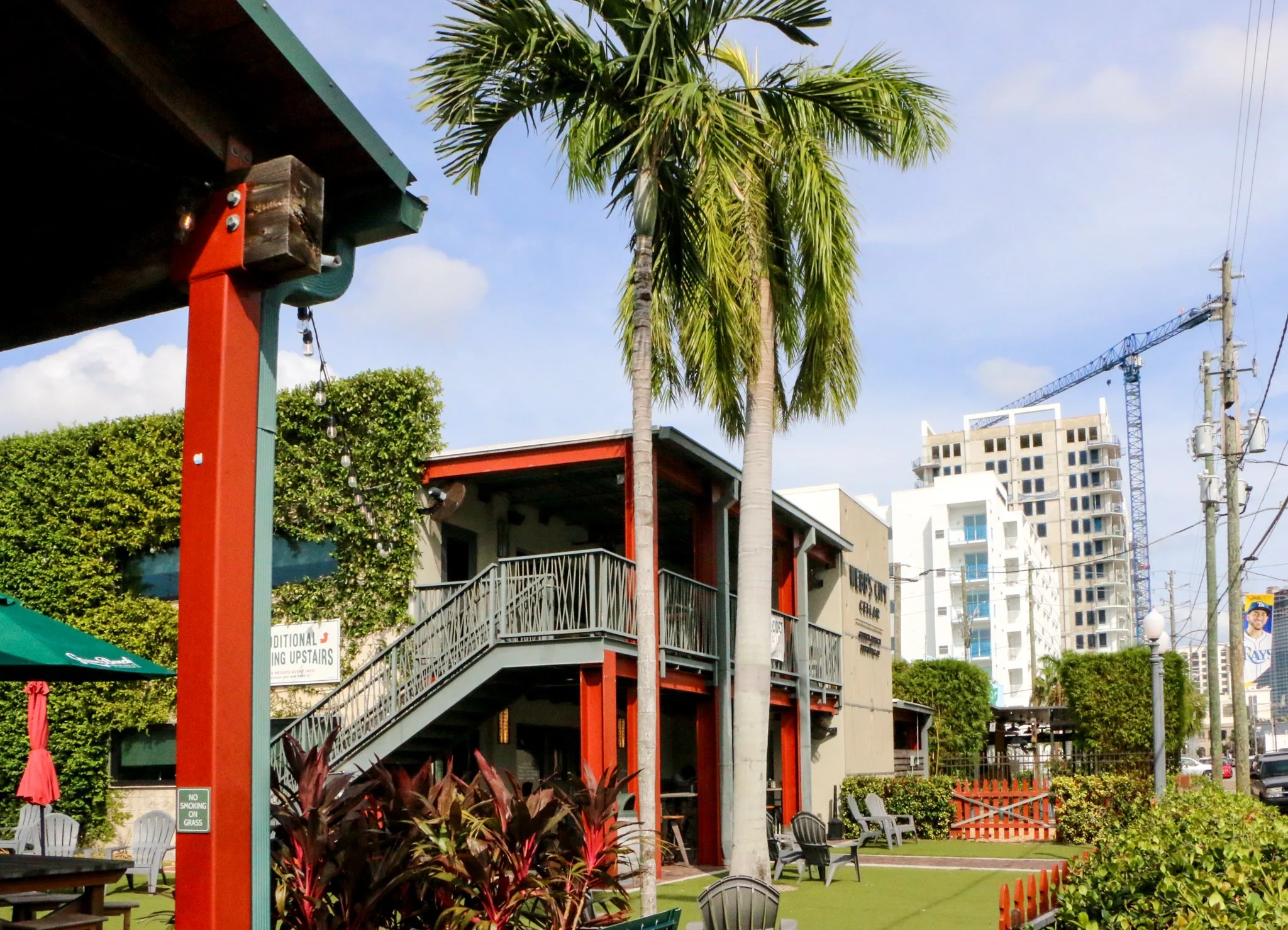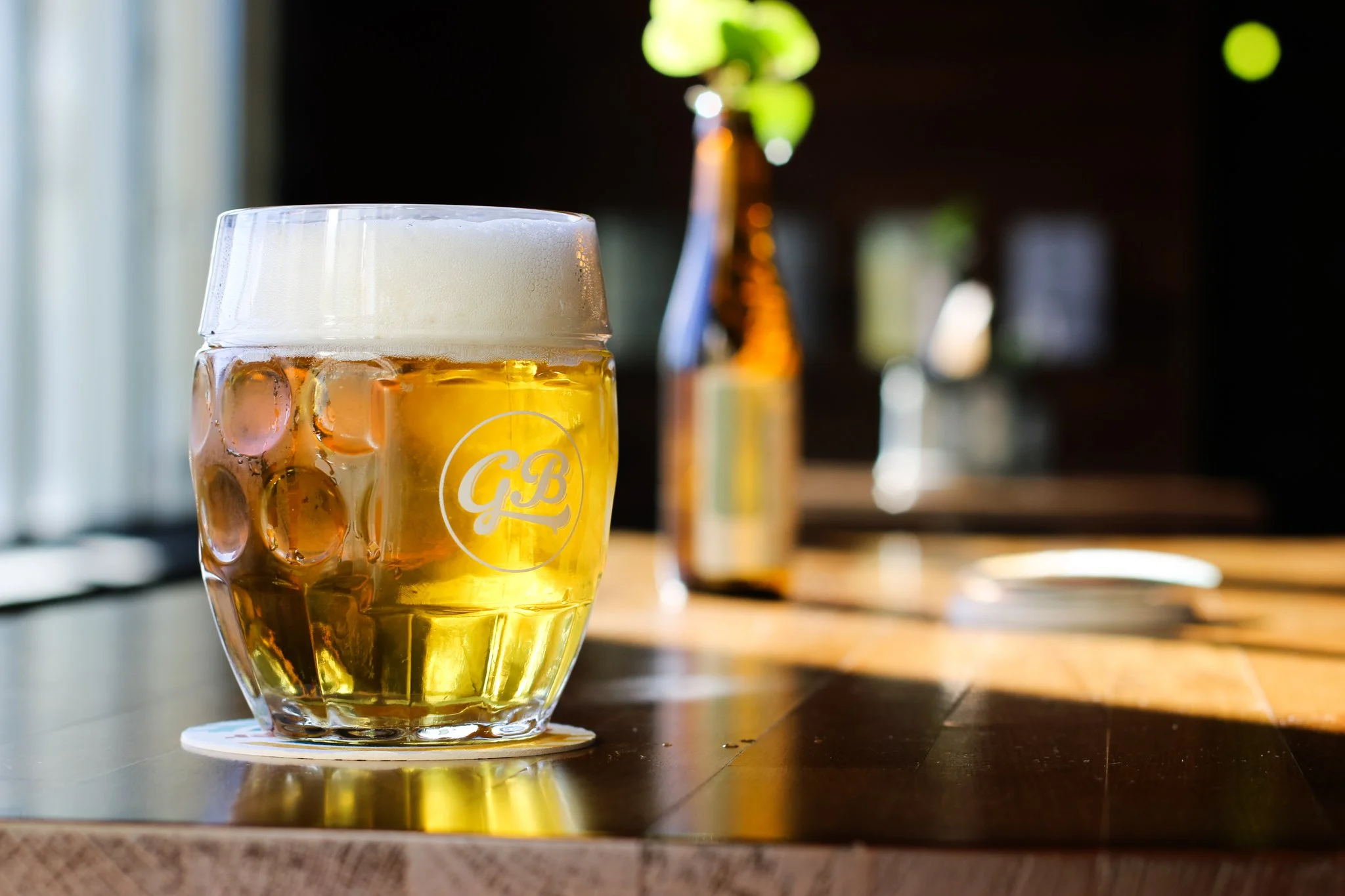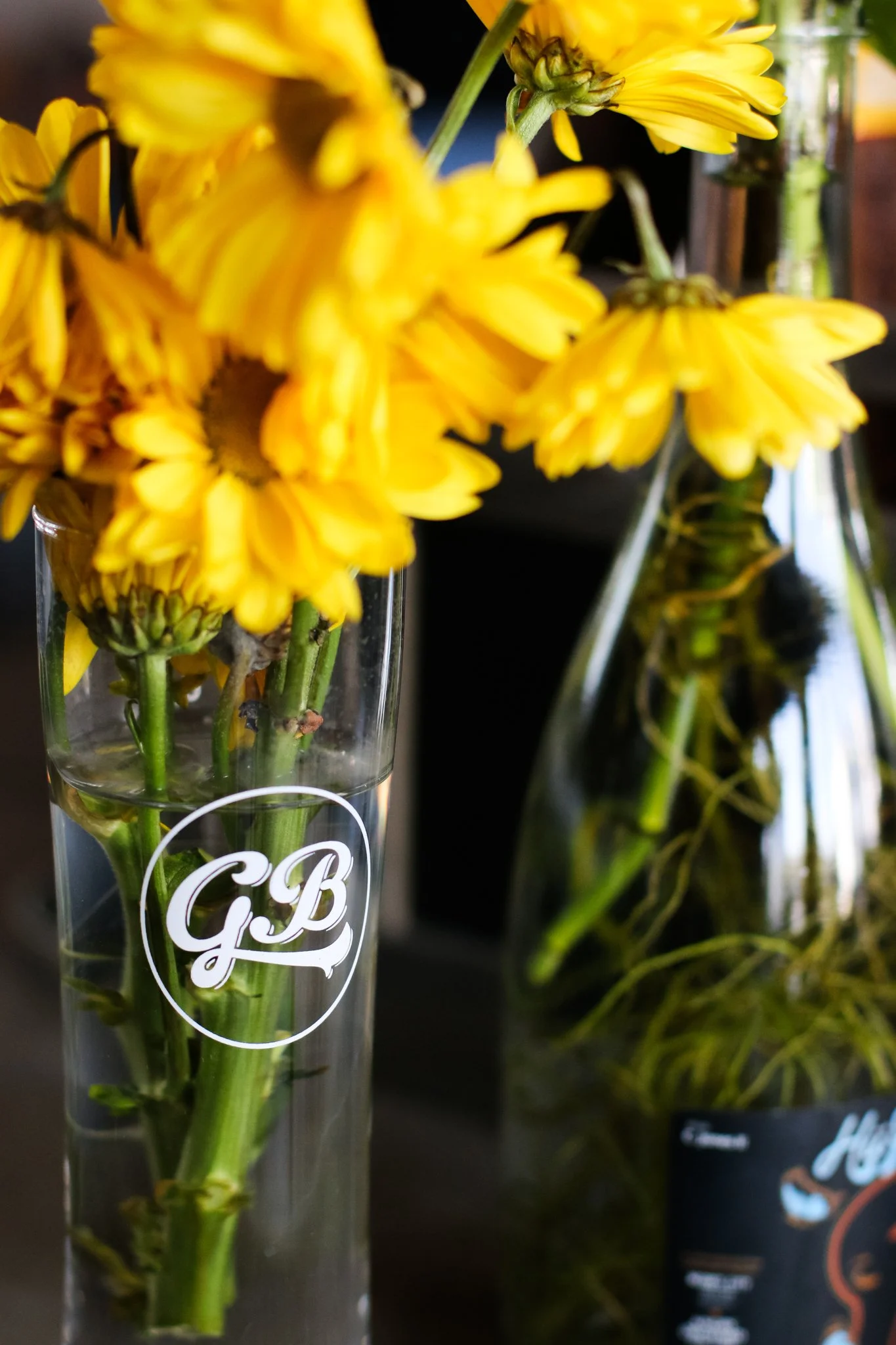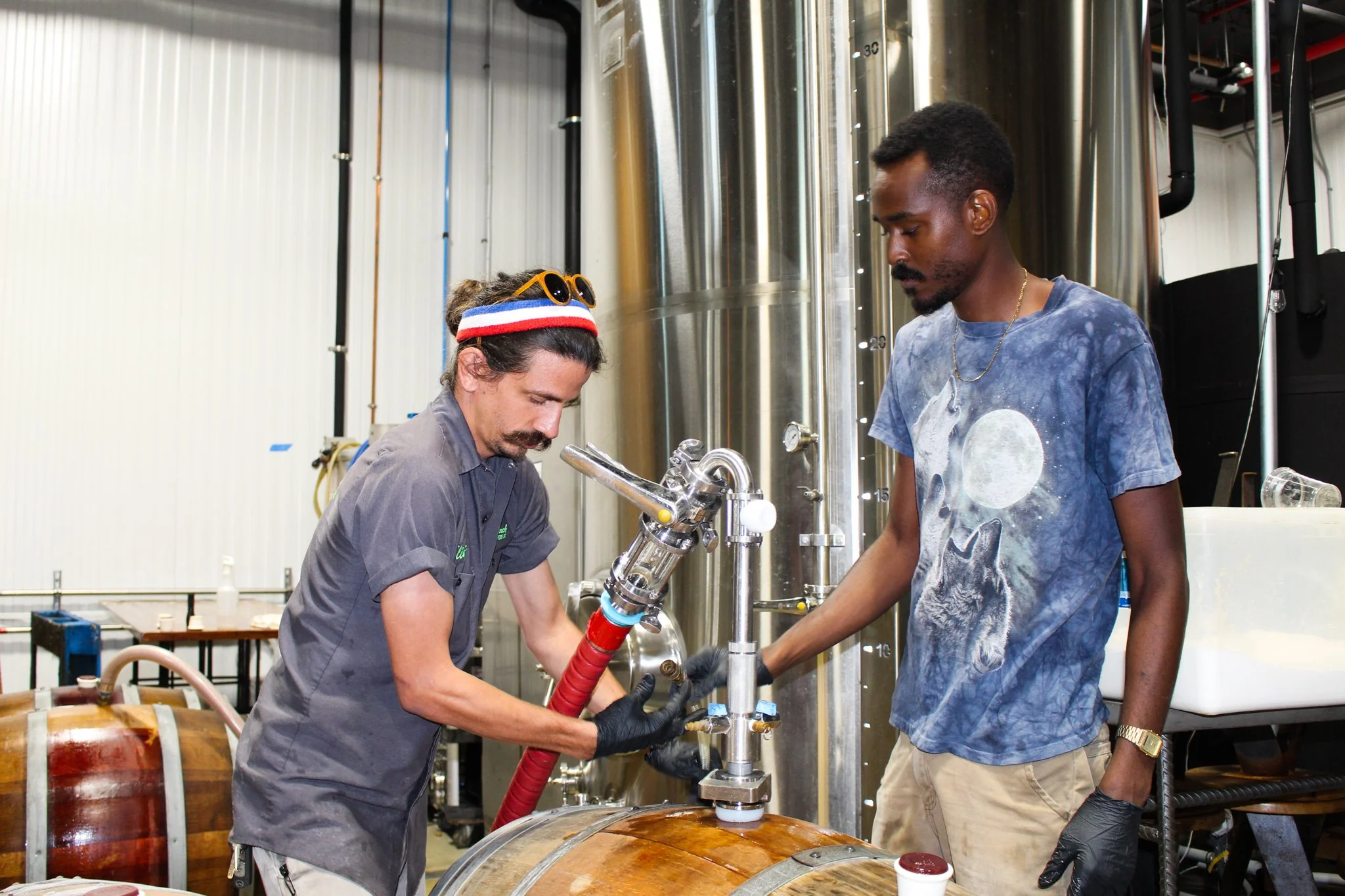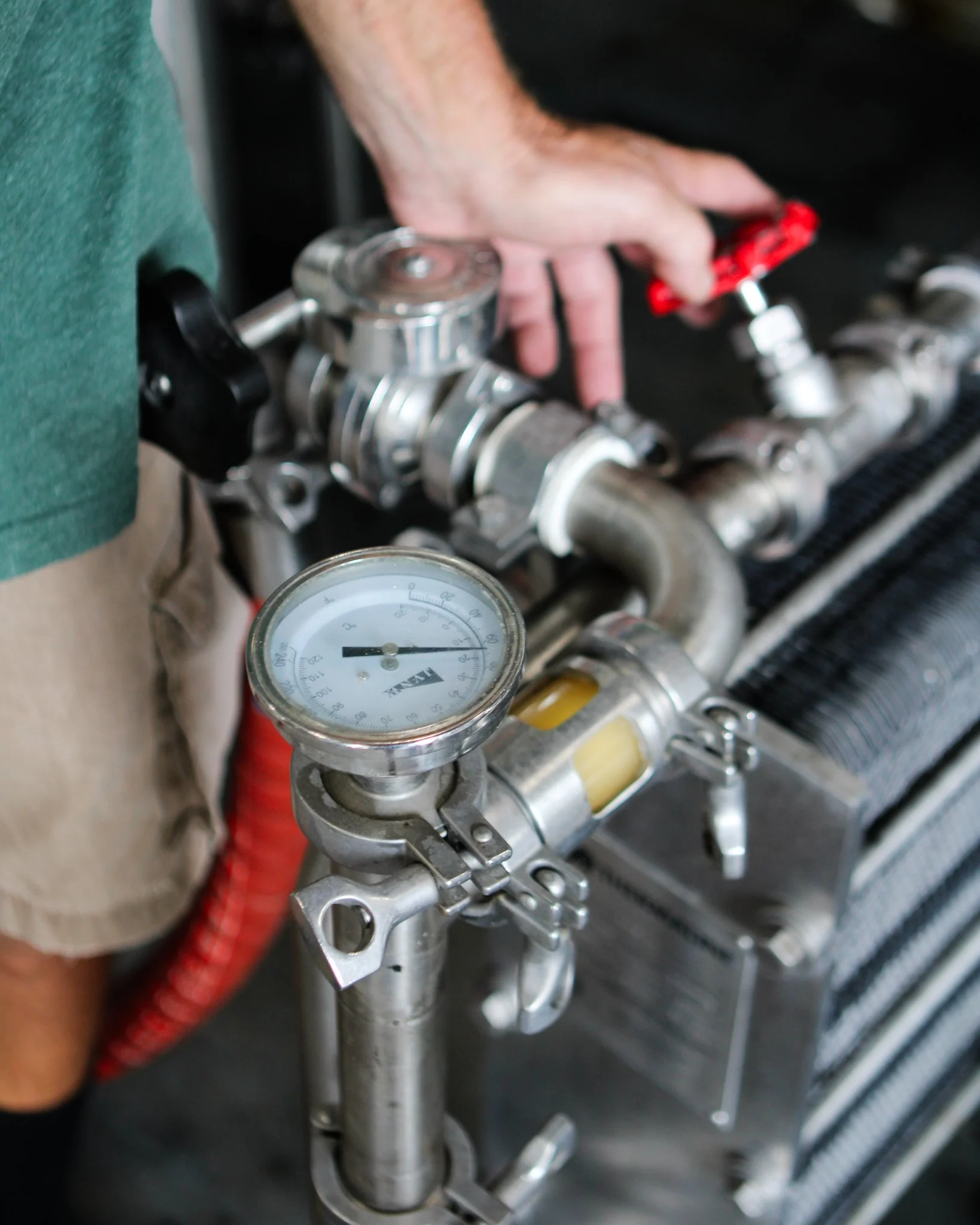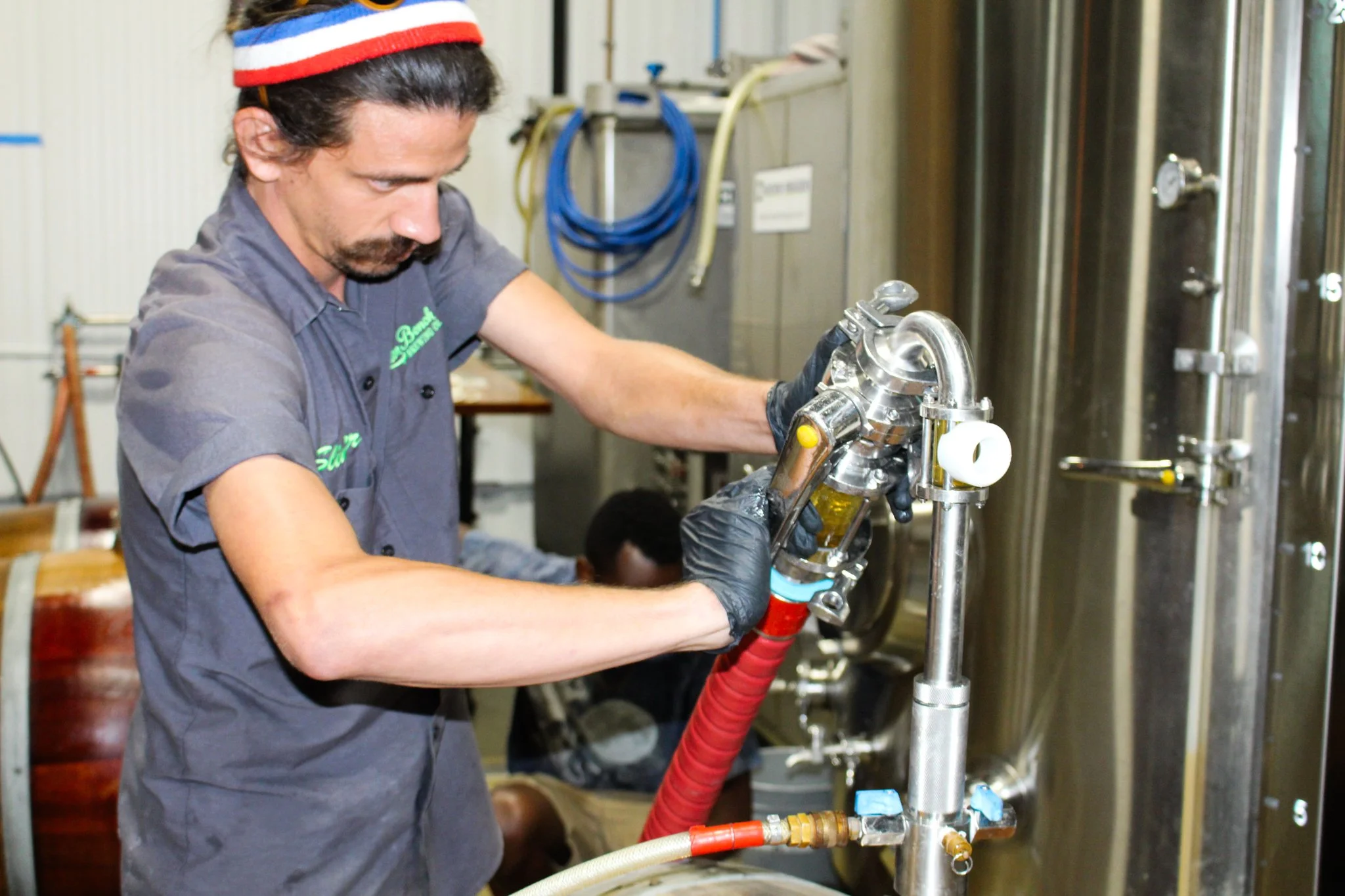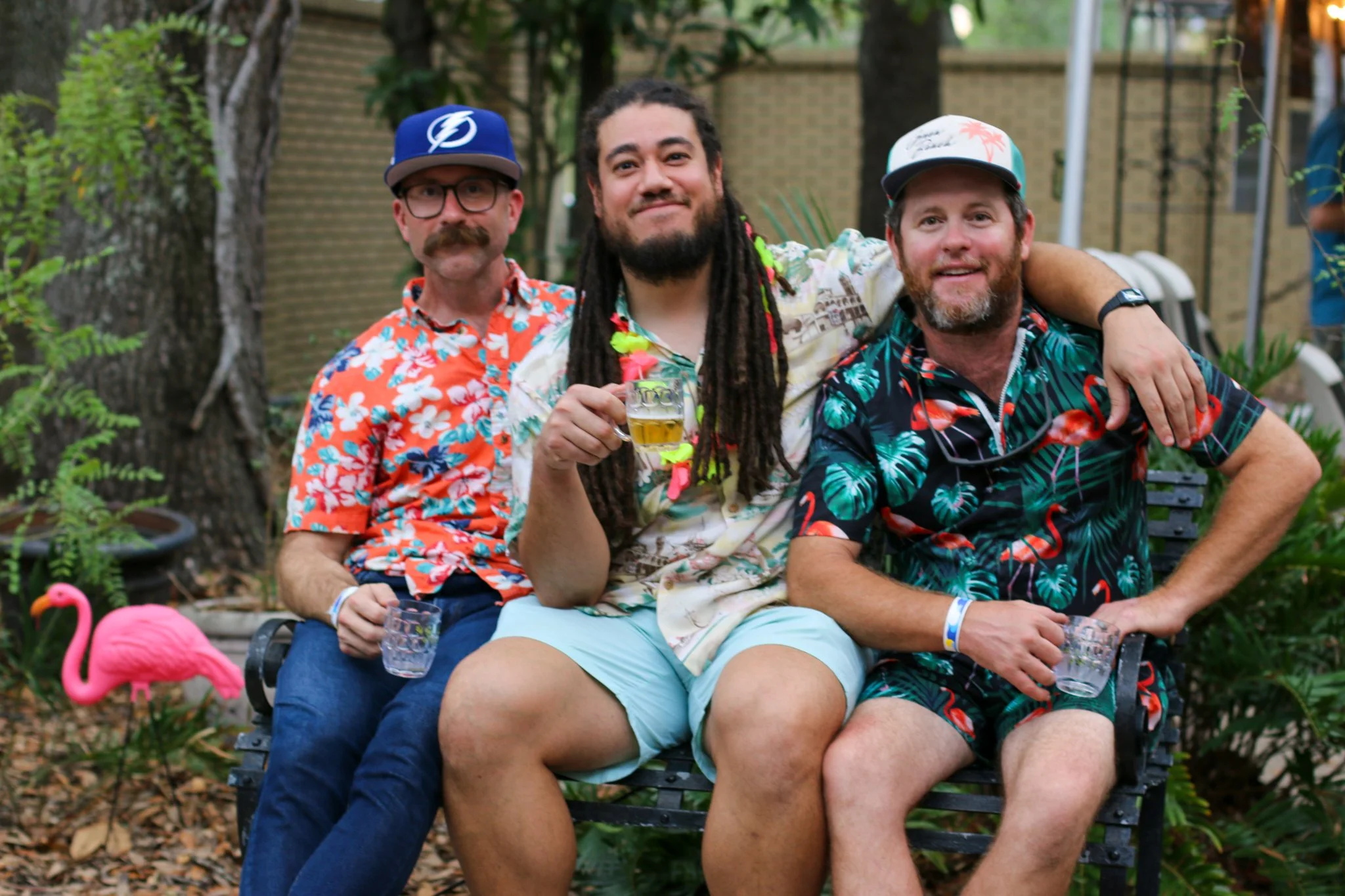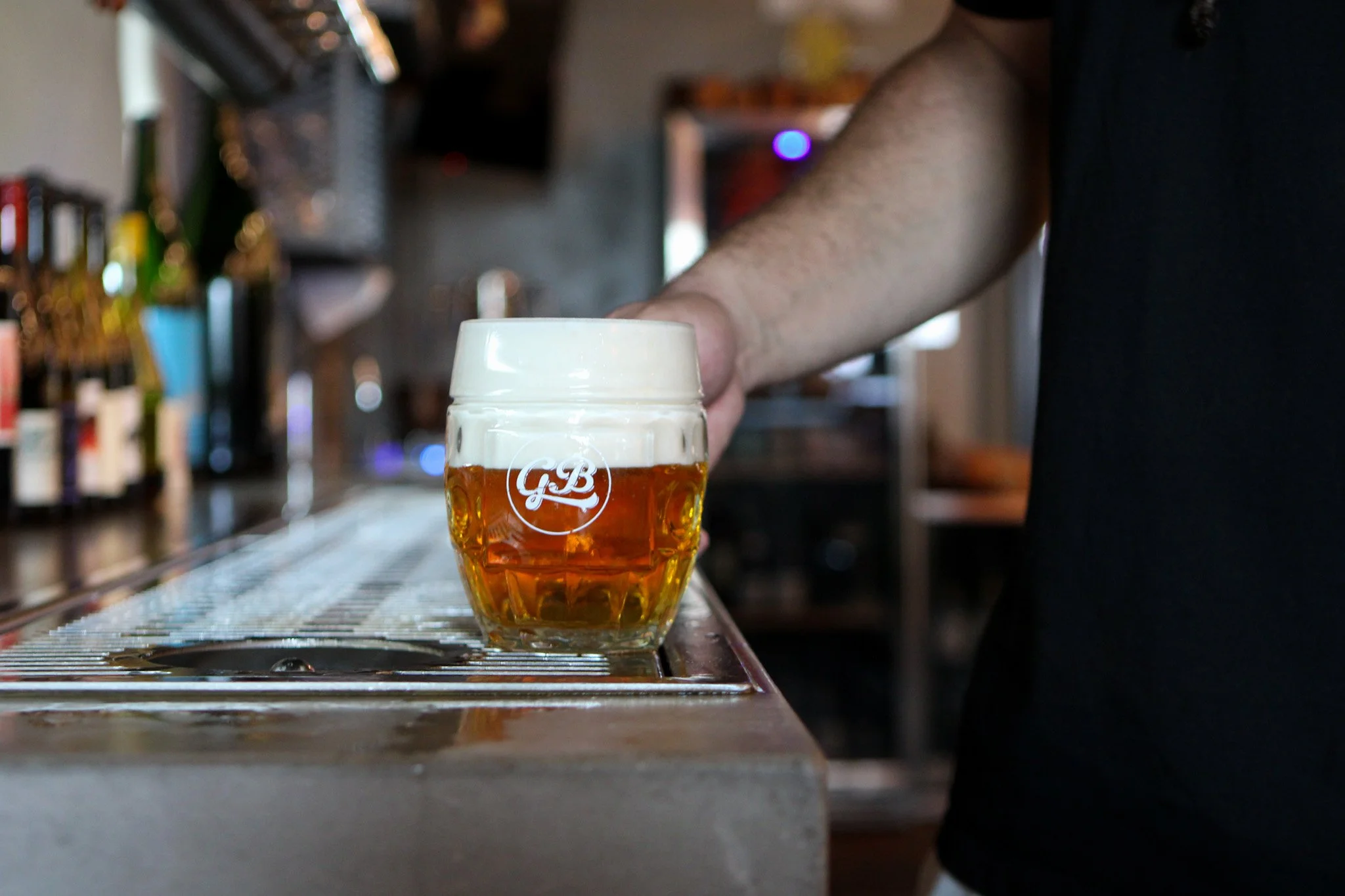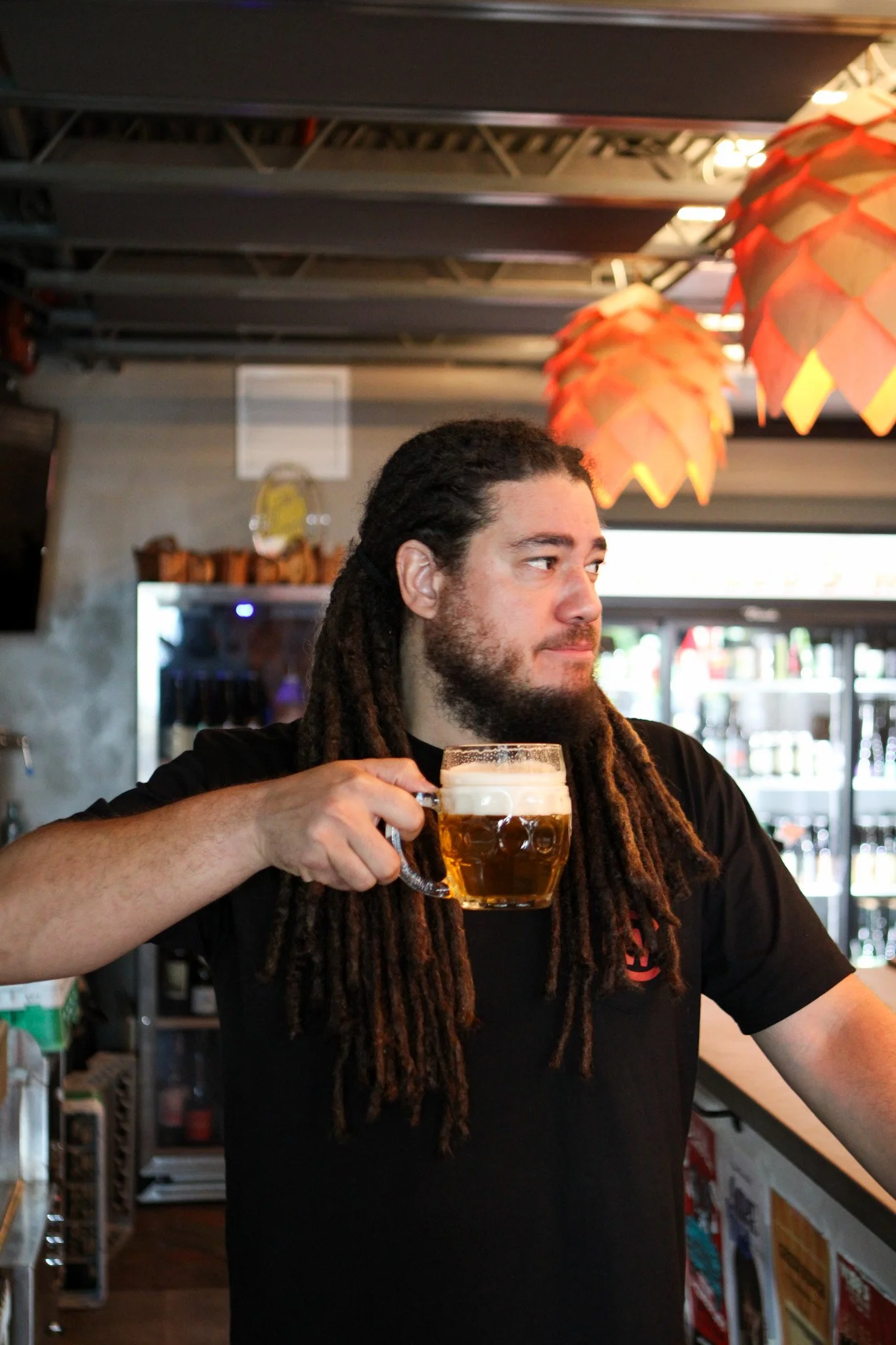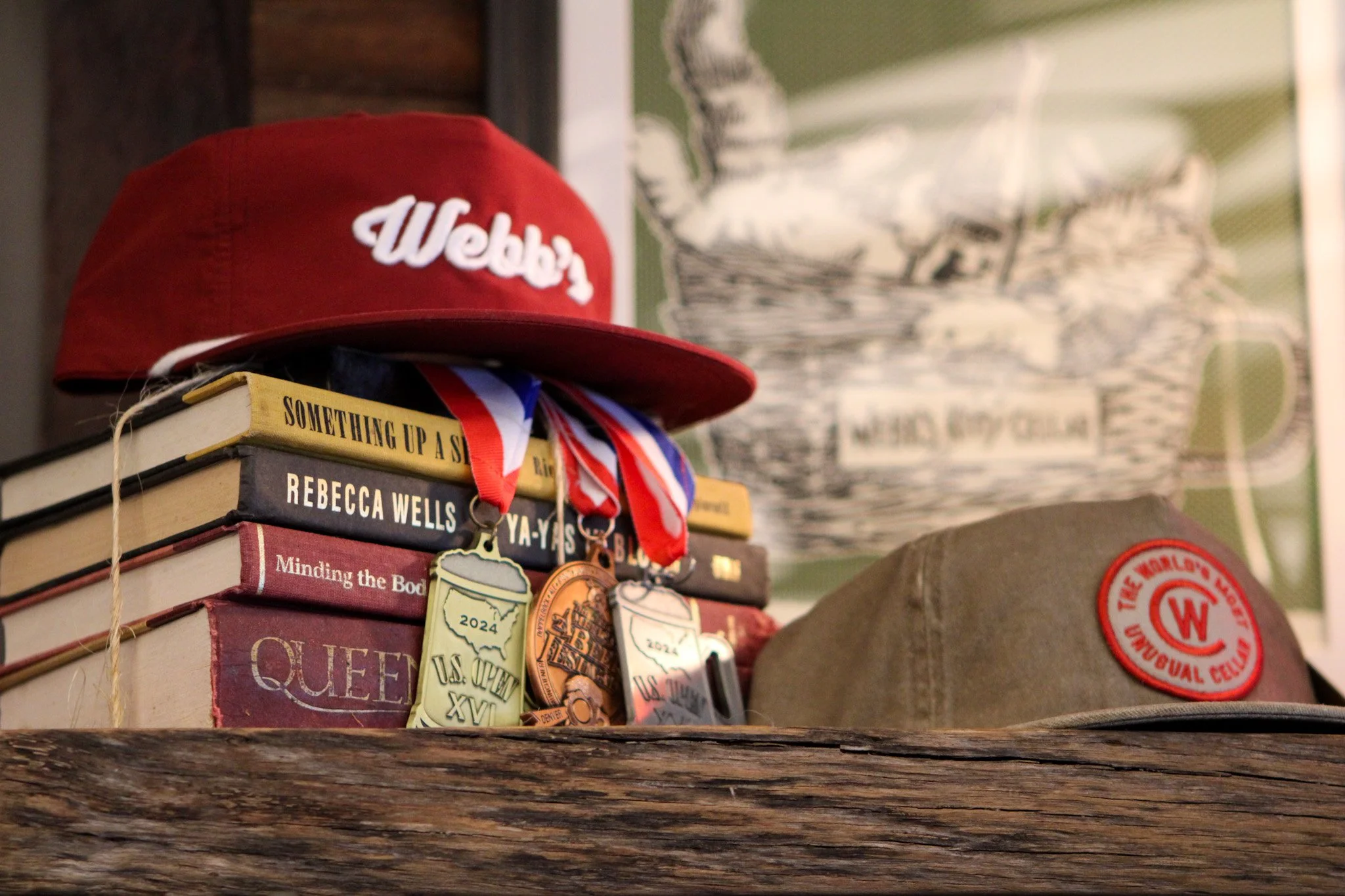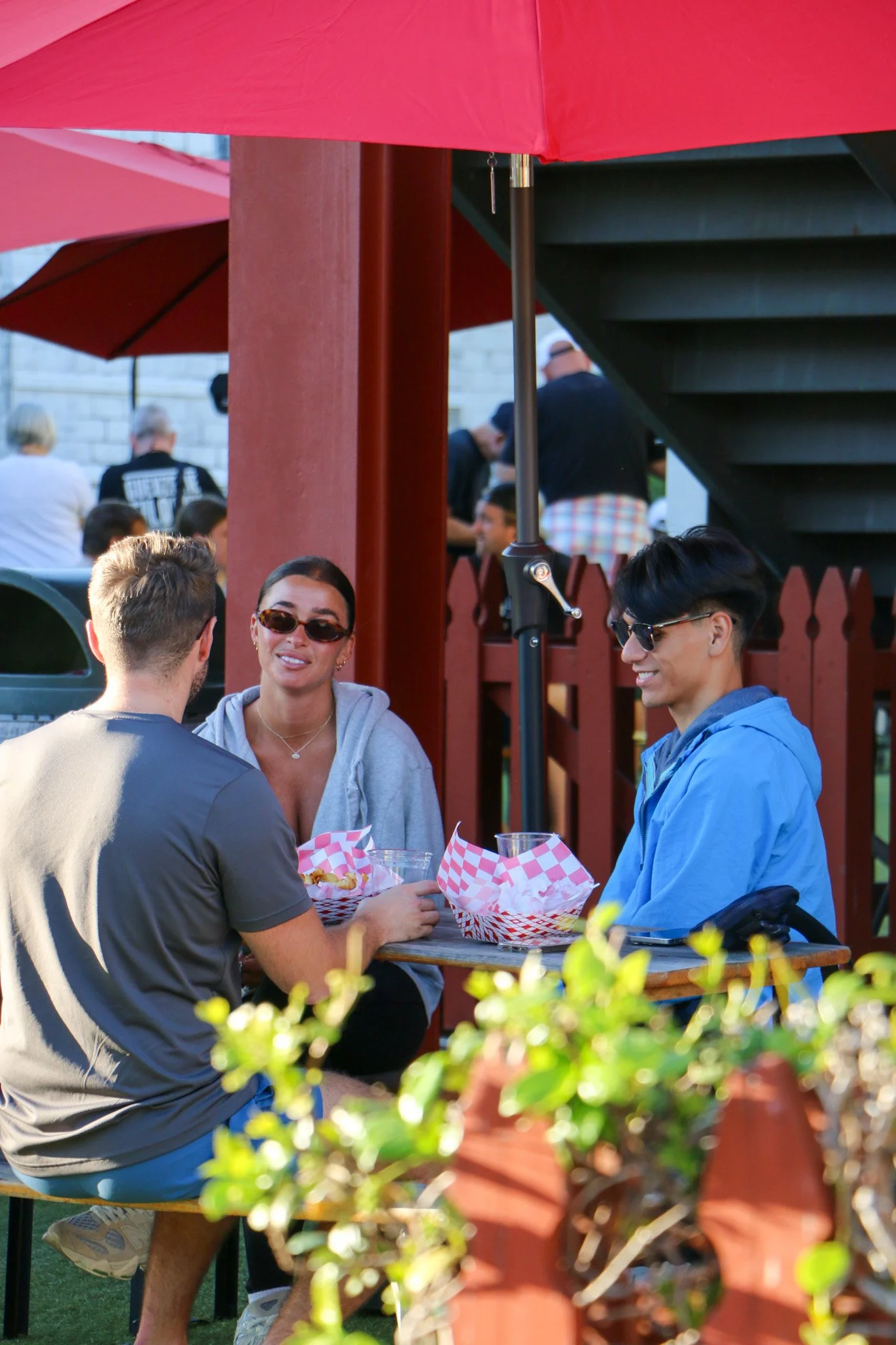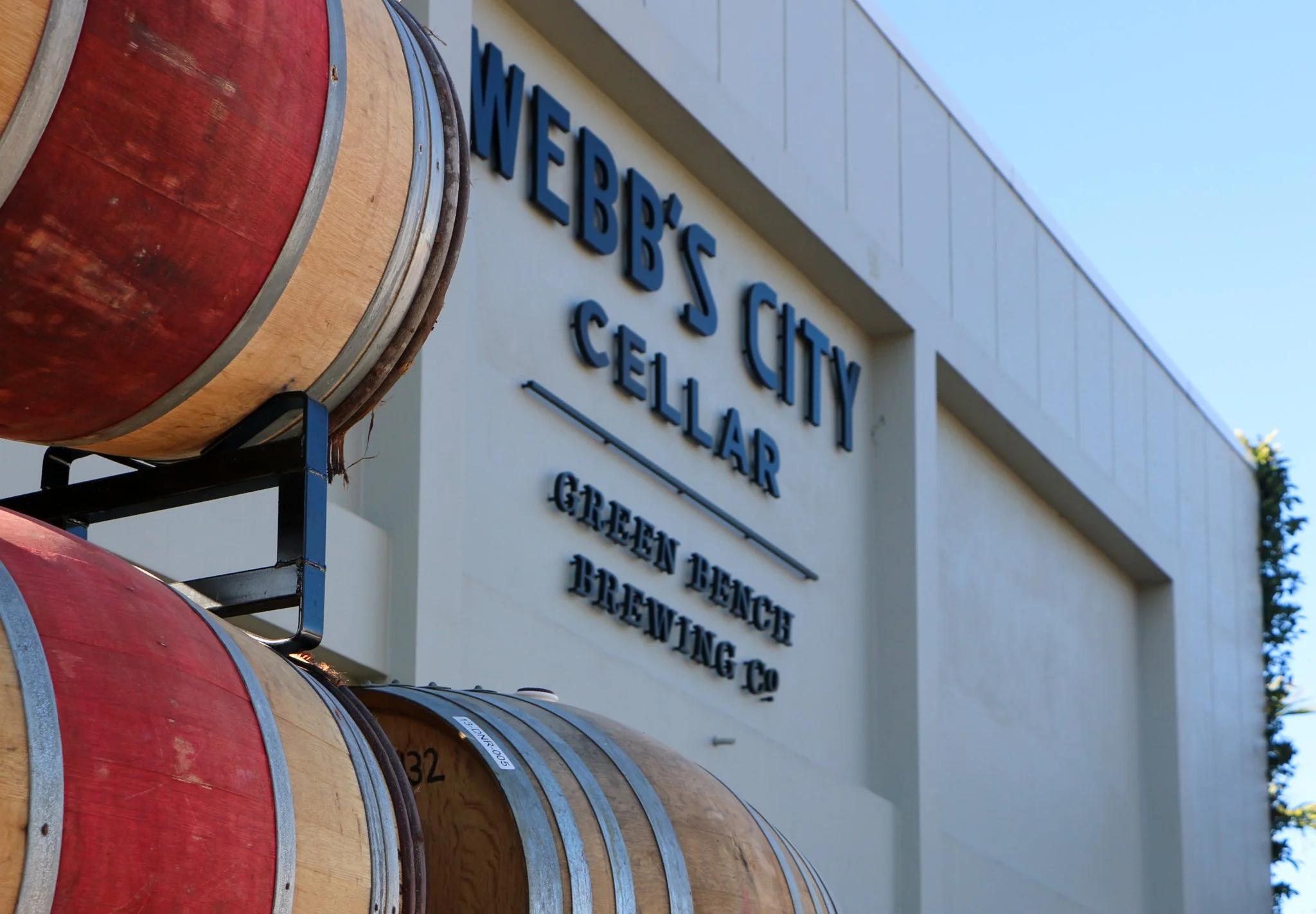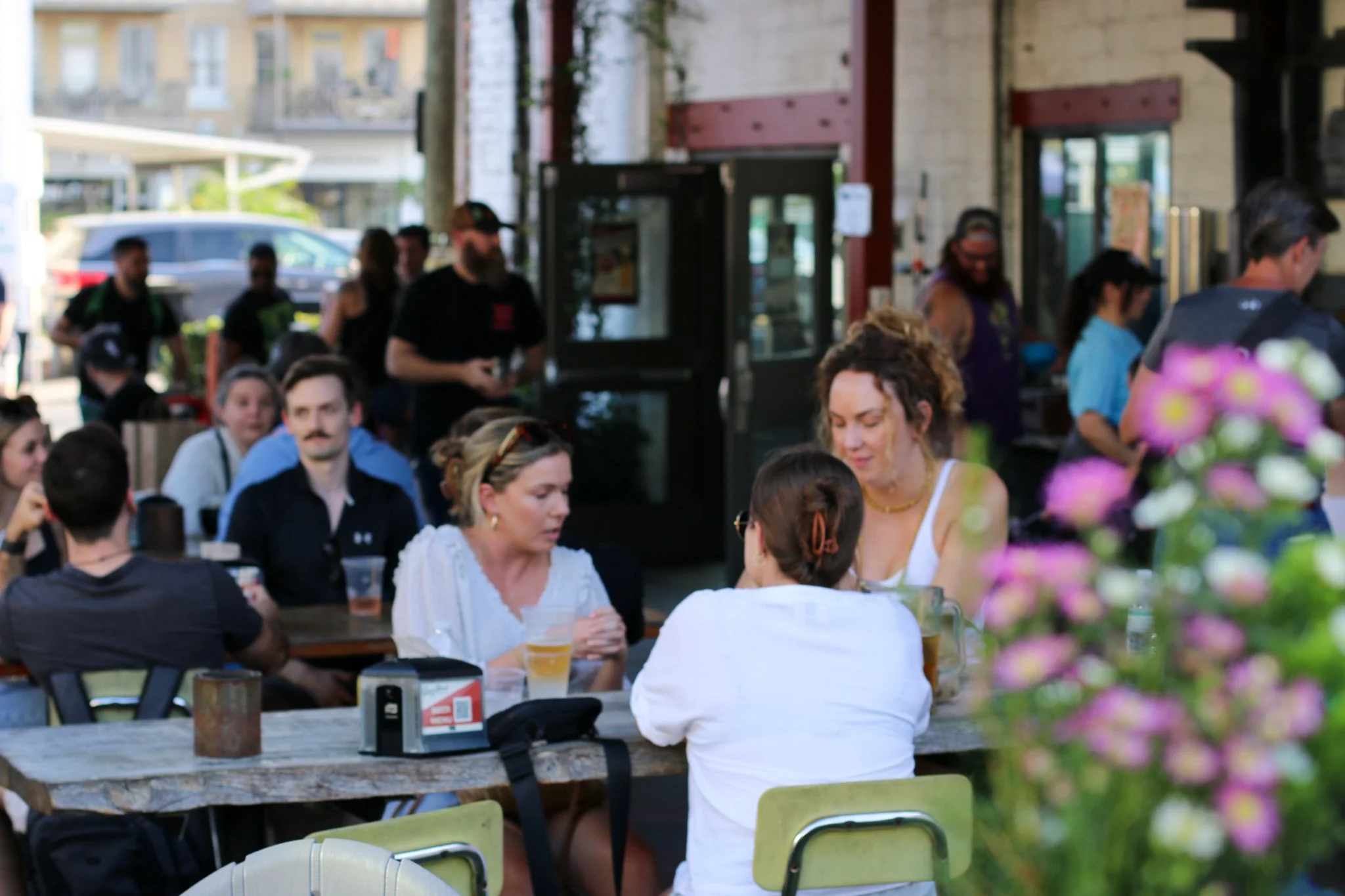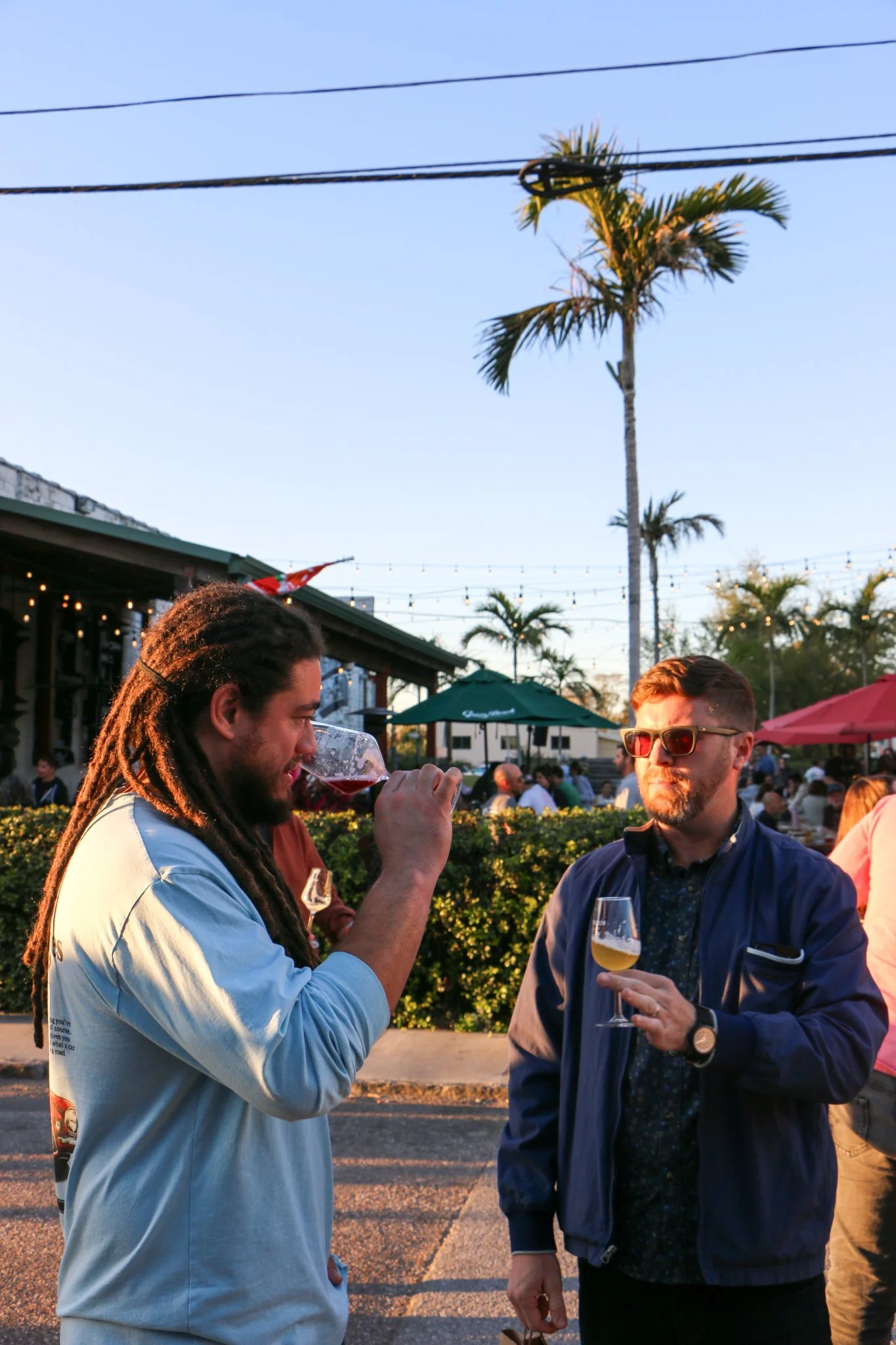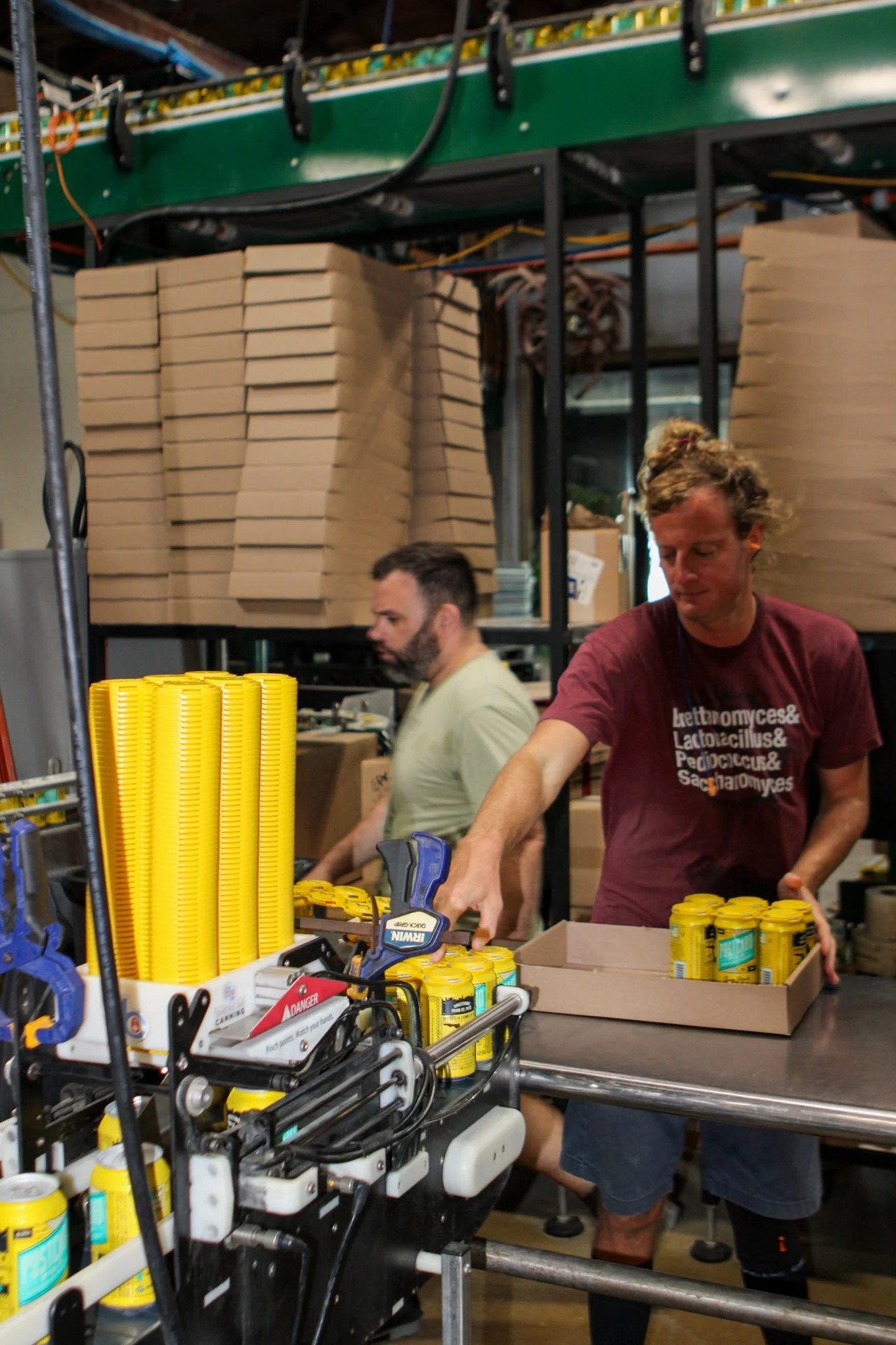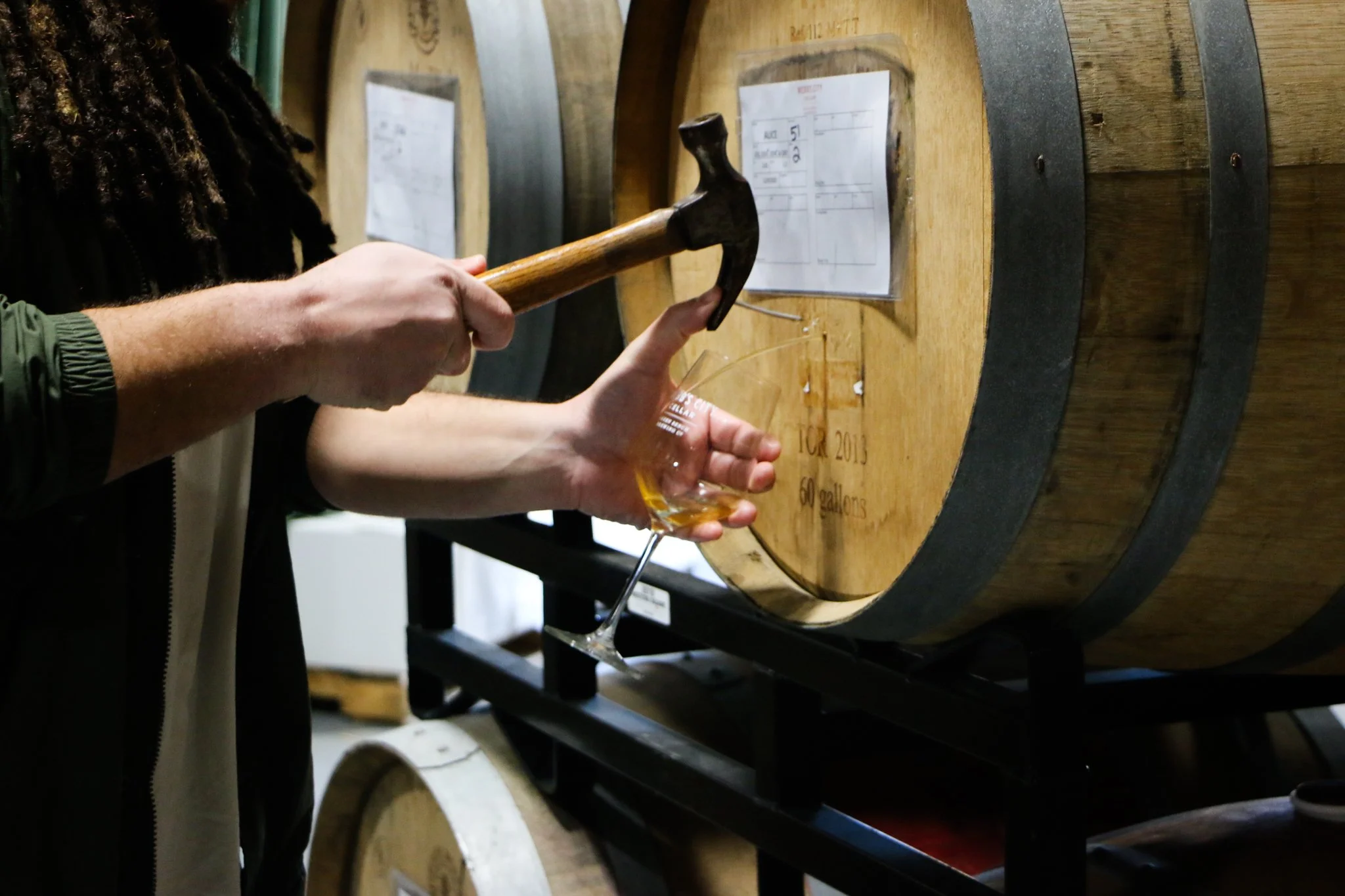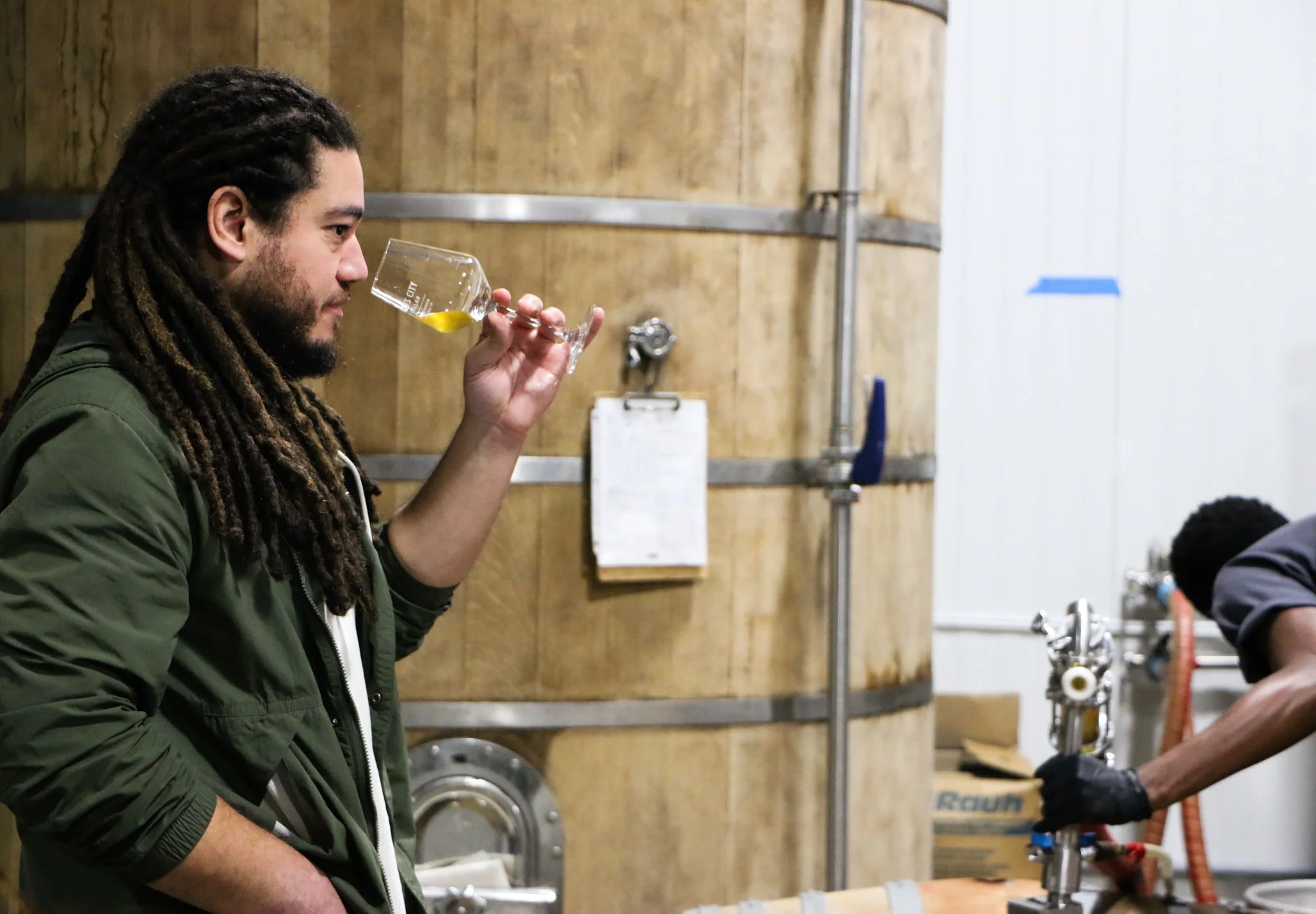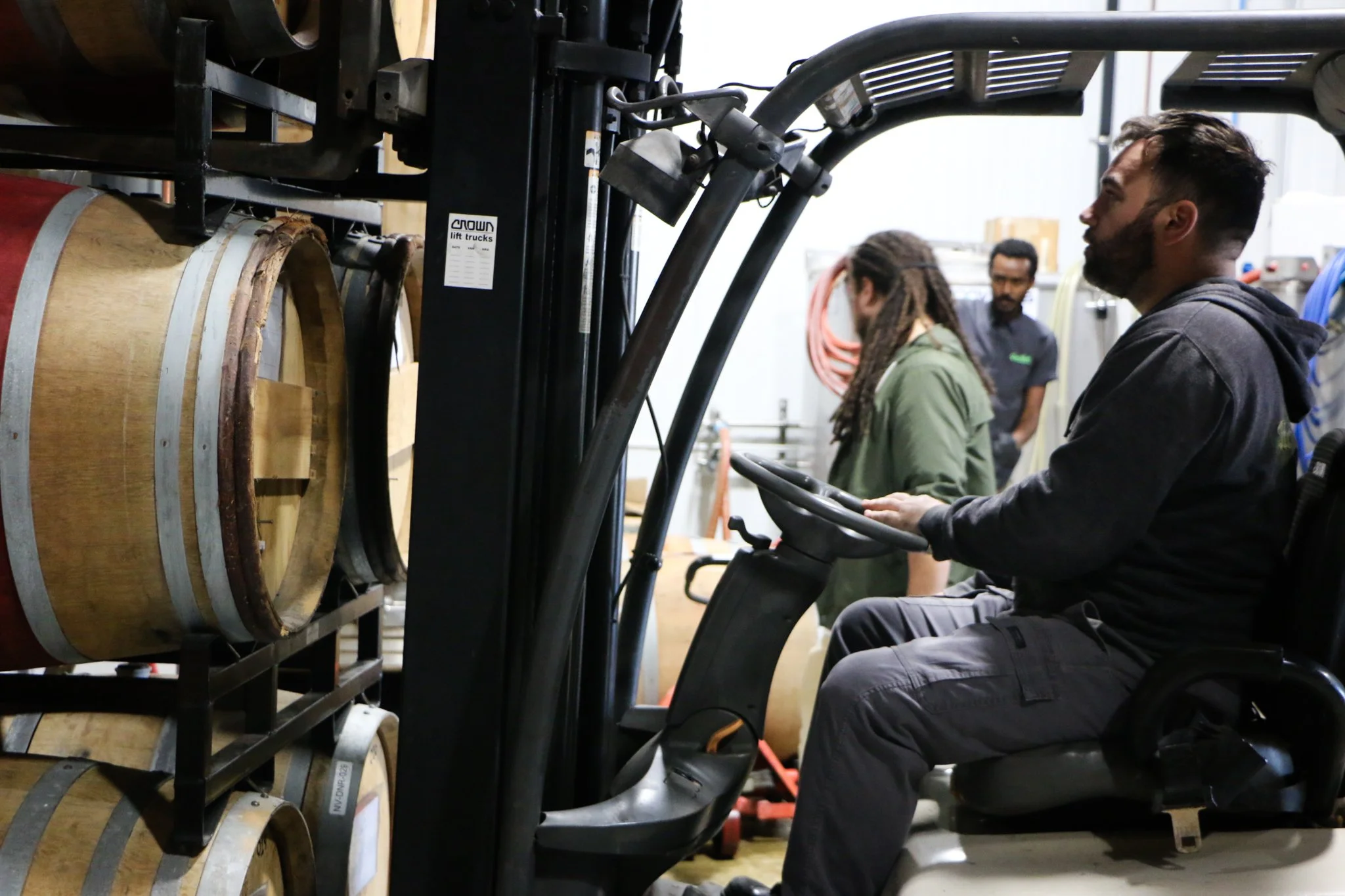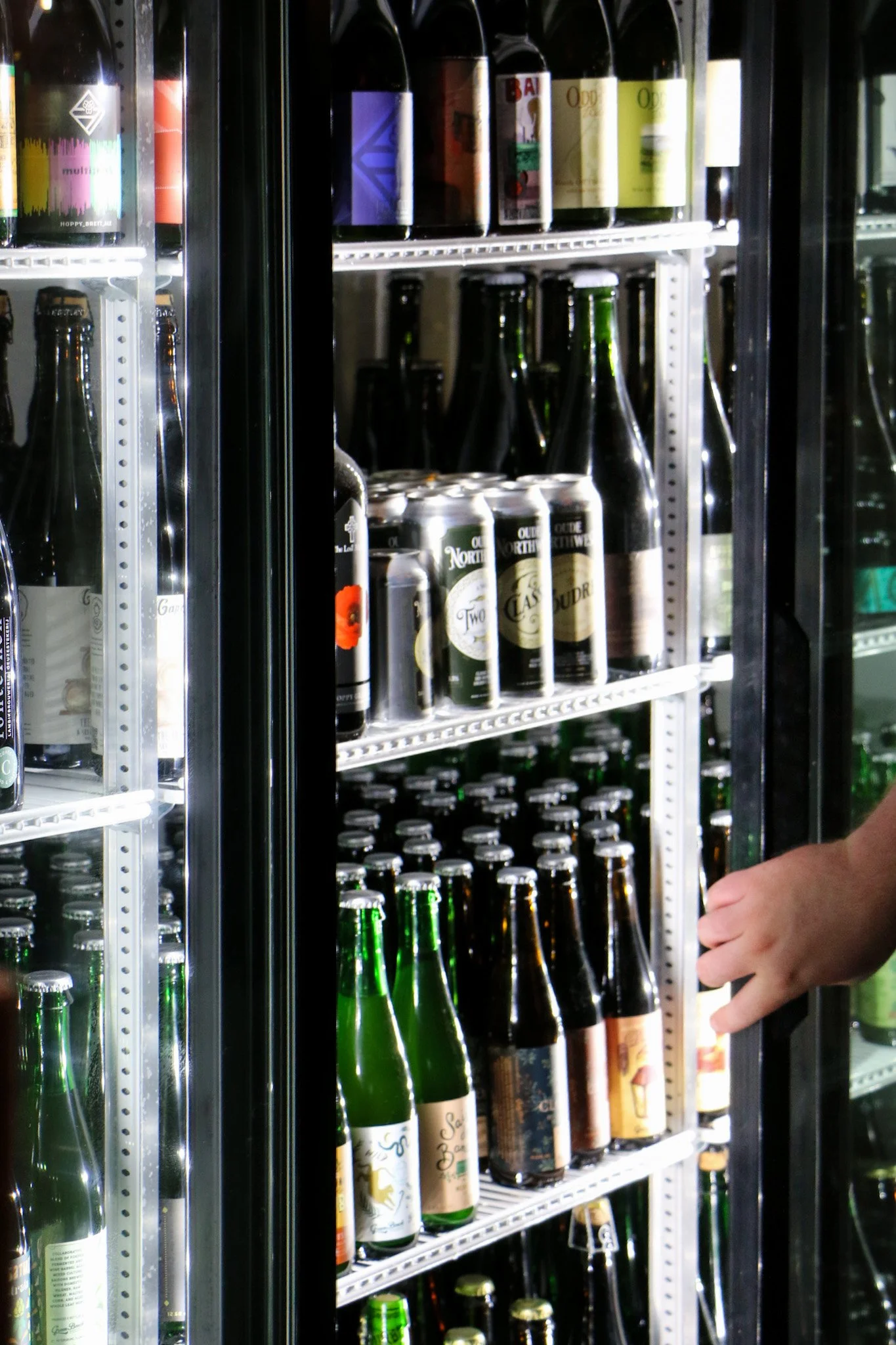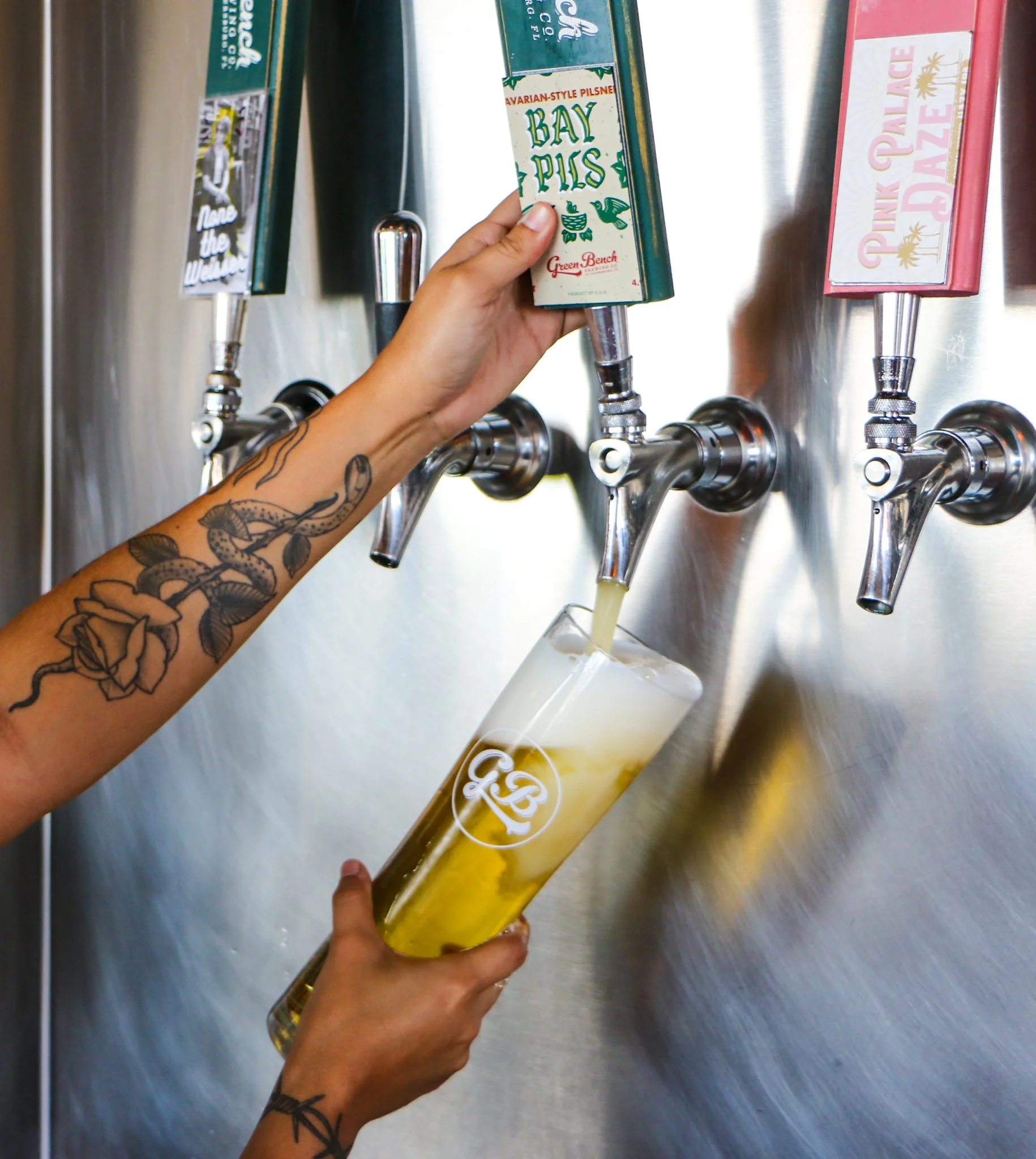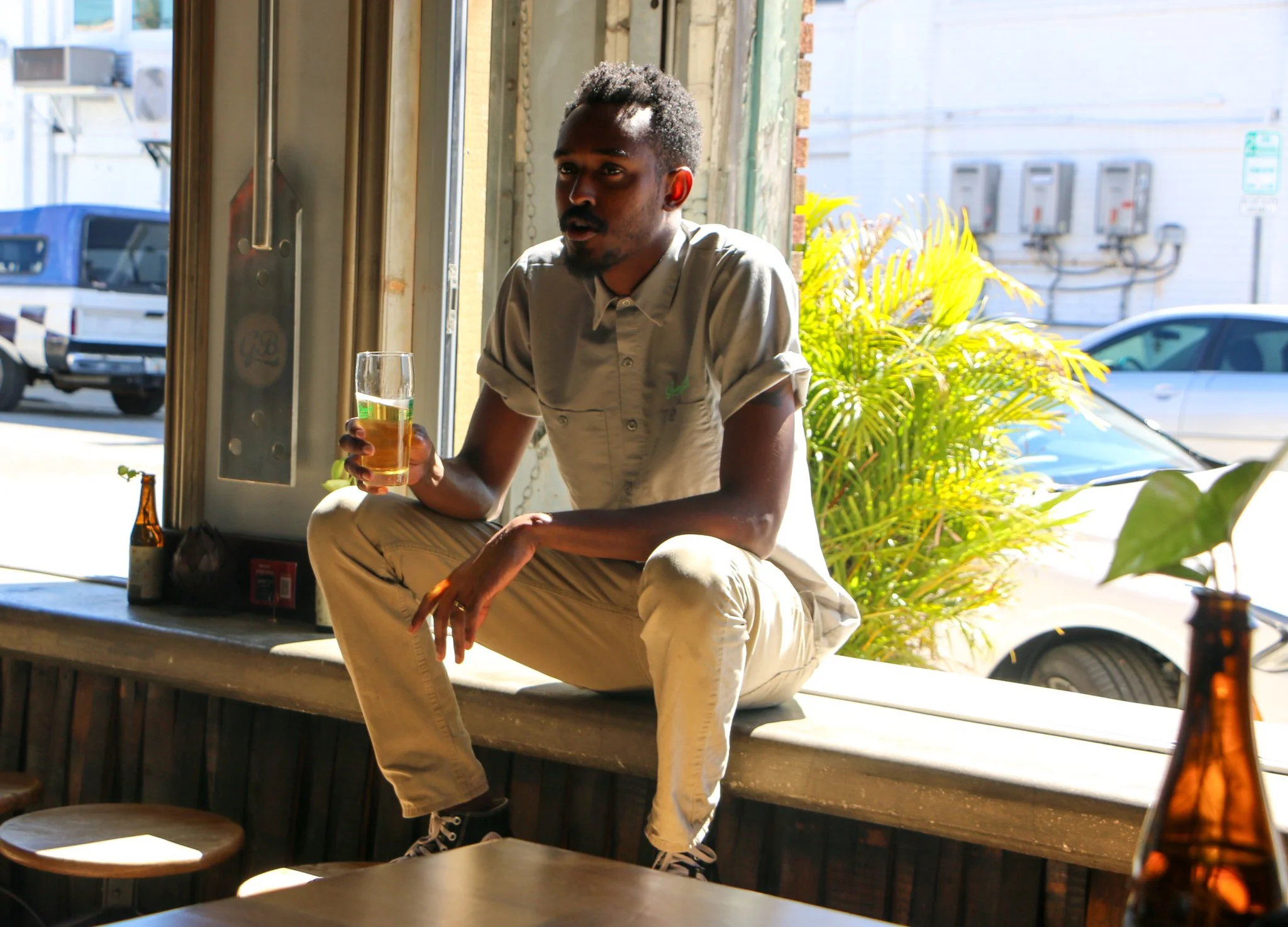A Stone of Hope — Green Bench Brewery in St. Petersburg, Florida
St. Petersburg feels like it could have been squeezed out of a soft serve ice cream machine. The Florida-city’s postcard perfect holiday energy is infectious, exuding a soft-focus quality of easy, playful ambiance that has been attracting tourists for generations. The 97-year-old Don CeSar Hotel—its Barbie-pink, fondant fancy exterior writ large—encapsulates its chintzy-meets-cool essence.
Today, St. Petersburg—colloquially known as St. Pete—has a reputation as being the Austin, Texas of Florida: a hip, inclusive, liberal hub amid a veritable sea of conservatism. A stroll down its streets reveals bright street murals and Pride flags hung high, while the sound of local bands filters from numerous small venues. When my husband and I visited during the balmy autumn of 2023, we felt right at home. We relaxed into the coastal lifestyle, splashing in the dolphin-coloured waves, sipping cocktails on palm-shaded terraces, diving into spicy seafood boils at dusk and dancing nightly at Passe-A-Grill’s beachfront hangouts.
Photography by Micki Bell
Rewind seventy years or so, however, and our experience of St Pete’s would have been very different. The Sunshine City might have been a holidaymakers’ paradise, but only if you were the right kind of visitor. The city’s unwritten law that people of colour were not permitted to sit on its famous green benches evidenced how St Pete’s did not escape Florida’s vicious segregationist policies of the time. This unofficial ordinance was more than simply a physical imposition—it was a restriction that entrenched systemic racism for generations of Black Floridians.
It’s for the memory of this injustice that Khris Johnson, founding brewer and co-owner of Green Bench Brewing and Florida’s first Black brewery owner, chose to name his business. His aim is one of forging ongoing conversation and education about civil rights and equality, while also pursuing the desire to create a social space that truly creates the sense of community the green benches falsely represented.
“I wanted to be able to tell the story of the green benches and the story of the city of St Pete’s and its history,” Khris tells me. “I felt that if we’re going to name it [Green Bench] then we needed to commit to that part, as it means something very strong to the people who live here. I’m not just going to throw it around. I want to represent the city as best I can, to be respectful and kind and helpful—that’s the goal.”
Khris is someone who commits himself completely to such goals. His terrifyingly diligent work ethic (he tells me his day usually begins at 5am) is an integral part of both his and Green Bench’s story. Yet Khris is also fun, laid back and full of humour. Every time we’ve hung out since meeting in Chicago during CiderCon 2023, we’ve had a hoot. This seamless blend of warmth and persistence not only make Khris a world-class brewer and cider-maker, they also leave him perfectly placed to be a custodian of the controversial history of St Pete’s.
***
“Brew Quality. Build Community.” This, Khris tells me as we first sit down to begin our interview, is the backbone of all decisions he makes.
“I’ve always seen beer as an opportunity to share. It’s about getting to know someone, learning and having conversations,” he says. Quality and community are the themes that we keep returning to, wrapping Green Bench’s identity in a Venn diagram whose outside rings form the newest of moons. The two come together as a force of mutual respect, coalescing in a way that Khris explains, should be: “So good that your experience goes hand in hand with the experience you’re having with someone else.”
Quality beer leads to quality conversation, which leads to community building and shared understanding. Big goals, as Khris admits, but then, he has never aimed small.
A polymath who swapped pre-med (training for medical school) and biochemistry for literature, while also volunteering as host and programming director for his college radio station, Khris took up homebrewing as a hobby to fill the time his change of major left free. He chose it, “not because I liked beer, but when I was in middle school my dad was a home brewer so I figured if he liked it and could do it I probably could too.”
By drinking mixed six-packs while cross-referencing with the Beer Judge Certification Program (BJCP) app, Khris tells me how he naturally learned while studying.
“I Googled terms as I came across them which gave me a good base knowledge of styles and how to speak about how to make them,” he says.
Soon Khris and his best friend Teddy were hanging out at Southern Brewing and Winemaking, a taproom and homebrewing store in the neighbouring city of Tampa, a 30-minute drive from Green Bench. Here they made friends and shared recipes with the Tampa Bay BEERS homebrew club at Mr. Dunderbak’s, a restaurant on the city’s north side. This was Khris’s first taste of beer as a community driver and clearly shaped his vision for Green Bench.
“There was a great diversity of people from all genders, ages, races and backgrounds—a motley crew of misfits I felt I would never see together in any other setting,” he says. “Beer is what brought these people together—it was amazing.”
““I’ve always seen beer as an opportunity to share. It’s about getting to know someone, learning and having conversations.””
With so many strings to his bow, Khris could have done anything. He chose beer because he sees brewing as a continuous learning experience, something he values highly.
“Beer can be as simple or as complex as you want it to be—that’s what made me fall in love with it,” he says. “It’s something you can work to perfect forever”.
Khris took on stints at Tampa’s Cigar City Brewing, and then Southern Brewing and Winemaking. Here he met Brian Wing and a relationship between the two began that would result in one of the most sophisticated urban cideries in the US.
“Long before Green Bench was open, we were already plotting how cider could be part of the picture,” says Brian, who joined Green Bench as head cidermaker in 2015 and became a co-owner in 2019.
But back in the early 2010s, Khris was still nerding primarily about beer. Picking up a state medal for a homebrewed IPA he had meticulously researched, Khris built up the experience and confidence to open a place of his own. Aged just 25 he began to plan his own brewery.
After a few false starts, Khris met his future co-founders, Nathan Stonecipher and Steven Duffy. Childhood friends working in finance and construction respectively, they shared a passion for homebrewing they wanted to develop entrepreneurially, and Khris was the missing spark.
“Our city was in the beginning stages of a renaissance of sorts, and we wanted to add to the change,” Nathan tells me. “St. Petersburg didn't have a microbrewery back then, and seeing how breweries truly helped build communities in other areas we travelled, we thought it would be a great addition to our local landscape.”
The trio distilled their shared visions into a plan to transform a strip of expansive but derelict property in St Pete’s all-but-abandoned downtown district. It was at this point in the brewery’s evolution the history and legacy of St Pete’s green benches became intertwined with both its and Khris’s role in the Tampa Bay community.
***
For nearly 50 years St. Pete’s famous green benches were a symbol of the Sunshine City’s easy ambience; an icon advertising Florida hospitality at its finest. The benches began life in 1908, when real estate agent Noel Mitchell placed a couple in front of his Central Avenue office to attract potential customers by offering a place to rest from the heat.
Other local businesses soon followed suit, and in 1916 Mayor Al Lang brought in a city ordinance citing all benches be painted the same shade of ‘hunter green,’ giving St Pete’s the moniker ‘City of Green Benches.’ Soon, thousands of benches lined the city’s streets and avenues, and people-watching outings became de rigueur for residents and visitors alike. Unless, of course, you were Black.
For the Black residents of St. Pete, the benches became a symbol of racist oppression—the exact antithesis of the inclusive, community-forward message they offered white people. As a tourist town dependent on Black labour, racism in St Pete’s differed from the violent domestic terrorism that permeated much of Florida, such as the 1920 Ocoee, 1922 Perry and 1923 Rosewood massacres.
The benches came to represent what historian Raymond Arsenault, author of St. Petersburg and the Florida Dream, 1888-1950, described as “a comprehensive system of Jim Crow laws superimposed on a sanctified code of racial etiquette.”
For example, Black nannies were permitted to use the benches when caring for white children, and Black people were only allowed onto the pier to work. The romantic gaze of white people relaxing, posing for photos from the comfort of the benches jarred bleakly with the reality of Black people who were only allowed into these hallowed spaces to serve them.
While the benches were phased out in the 1960s as part of an effort to modernise the city, memories of them still linger. When Khris first proposed the idea of naming the brewery after the landmark for which the city was best known but whose connotations are so extremely divisive, he was unaware of quite how controversial this would be.
Born and raised in Memphis, Tennessee, Khris moved to St. Pete aged 10. There was little discussion about the green benches while he was growing up, but when looking for a brewery name that would make a connection with the city, the green benches came to mind. Suddenly, he found himself having difficult and conflicting conversations.
“My family didn’t live through it, they’re not from here,” Khris says. “But Nathan and Steven are, and their families and friends would talk about the green benches. As the different stories and experiences reached me I began to understand the depth and breadth of the history.”
““Our city was in the beginning stages of a renaissance of sorts, and we wanted to add to the change.””
“The green benches were not without controversy,” Nathan adds. “[But] we wanted to show a new era of our town and how far we've come.”
Khris wasn’t afraid to have difficult conversations about their choice of name, even if it meant opening up old wounds.
“I think Memphis represents the privilege of being a person of color in this country,” he tells me, quoting Desmond Bane, shooting guard for the Memphis Grizzlies basketball team. “I had the privilege of growing up there and having grandparents who marched in the Civil Rights Movement and I Am A Man marches.”
Coming from Memphis, looking history in the face, understanding it, and learning from it is deeply ingrained in Khris’s worldview. His family were open with him about the challenges he would face as a Black and biracial man, and he was raised with the knowledge that his uncle had, horrifically, been lynched.
“In our city we can still see the slave houses, where slaves were sold on the Mississippi and fields of cotton where our grandparents picked and they would take you there and show you where they picked cotton,” Khris says, citing the Lorraine Motel—the site where Dr. Martin Luther King Jr. was assassinated—as a contemporary example of why acknowledging history is important.
“It’s kept exactly as it was so you can experience and feel what it was like—to keep the relevance of what happened for people who didn’t experience it to understand.”
In St. Pete, opening a discussion about the city’s green benches was not met with the same outlook.
“There are people here who don’t want to have those conversations, some who boycott us,” he continues. This, Khris thinks, is okay—he wants to be respectful to all. Nevertheless, he has persevered, both with the brewery’s name and with a progressive focus on reconciliation and reclamation. In addition to listening to stories from friends and acquaintances, Khris has taken an active role in community initiatives, such as 2020’s Beyond the Green Bench: A Community Conversation for a New Generation symposium.
Co-sponsored by the Carter G. Woodson African American Museum and the Florida Holocaust Museum, community members openly discussed the gaping chasm in memory the benches provoked from St Pete’s white and Black communities. For Khris, this is how healing starts. He highlights the need to acknowledge these different experiences, listen and discuss collaboratively with the goal of creating a situation where people can all sit together on the benches and enjoy them.
Nathan concurs: “From day one we discussed not just opening a business, but creating a place that would challenge and hopefully bring our community together in different ways.”
This sentiment of hope, collaboration, history and community is captured perfectly in WEDU’s 2024 Suncoast Regional EMMY-winning documentary Saint Petersburg: Brewing a Community. Producer Danny Bruno was intrigued by the history of the benches and why the brewery was named after them and found the story an ideal fit for his Greater Saint Petersburg series.
“We thought both the historical aspect and the origin of the brewery were quite compelling and it seemed appropriate to highlight both of those within the segment,” Danny explains. “The challenge was to find interesting parallels and cross-points to effectively weave the two story points together.”
Working with Khris and the St. Petersburg Museum of History, Danny and his team captured the essence of Green Bench’s goal to, “reclaim this historical St. Pete icon, in a way that makes [the benches] a truly communal figure in a new space where no one is excluded on the basis of race.”
These community-led values run through all Khris’s achievements as advocate, activist, philanthropist, mentor, educator and industry leader. It demonstrates how his brand of direct discussion and open-mindedness paired with his trademark steely perseverance goes a long way in making change and inspiring others, in Florida and beyond.
Just a few of Khris’s roles include being a faculty member of USFSP Brewing Arts Program, vice president of Beer Kulture and working with local charities including American Stage Theatre and Building Beds. Plus there’s a rotating charity tap at Green Bench and support for staff in their own voluntary and charitable work.
Trailblazing beer author, judge, philanthropist and Brewmaster at Brooklyn Brewery Garrett Oliver works with Khris in many capacities, including the National Black Brewer’s Association board and the Michael Jackson Foundation for Brewing and Distilling board, of which Garrett is chair.
“Khris really is the whole package—he’s one of the best brewers in the country, he’s already involved in higher education and scholarship programs, and he has a deep and abiding care for the community and our awardees,” Garrett says. “It’s meaningful to other brewers of colour to see him out there working at the highest level.”
***
When Khris and I meet for these interviews in January 2025, I am in dire need of inspiration. Our halcyon 2023 St. Pete visit is a distant glimmering memory of what felt like a safe, happy time, bathed in an assurance as warm as the Florida sun that things were, basically going in the right direction.
Now, the creeping shadow of President Donald Trump’s recent inauguration is ever-present. Even the weather has received the message, unleashing one of the worst snowstorms ever to hit the Southeast, breaking records going back to the nineteenth century in Florida as well as Alabama and Louisiana. Nearly 30 hours of driving through snow and ice have brought my husband Justin and I back to a very different feeling city, whose solemn winter stasis seems eerily appropriate.
“At one point I thought we were past this, but we’re not,” a somewhat muted Khris says. “At one point I thought we had agreed this was a bad thing, but [it turns out] we did not.”
That perceived social contract of progressive equality, the one both of us have invested in personally and professionally, is in bits. I am, truth be told, struggling—as an activist, a progressive, a person of colour and ultimately as a human—but I wait until our second day of interviewing, sitting on Green Bench’s astroturf deck on a bitingly-cold morning, to ask what is, for me, my most important question: how in the hell are you coping? Khris’s responses match everything I’ve learned about him—thoughtful, analytical and practical while being empathetic and optimistic. This interview could not have come at a better time.
“When someone in power tells you to blame someone or something, like a DEI program or a group of people, a lot of people believe that shit,” Khris says. “Not because it makes sense but because they are being given an answer to a question they don’t have an answer to.”
We discuss the politics of fear and Khris highlights how he “tries to understand that it’s usually not the fault of those behaving that way but of those in power,” something I often struggle with. While Khris tries not to burn bridges, he will move on from interactions that aren’t going anywhere, yet even so, empathy still prevails.
“The truth is most of us are fucking scared. Most of us are terrified,” he says.
While never sugar-coating the severity of what we’re experiencing, Khris is also firm in pointing at the positives. “[The beer industry] looks a lot different from a decade ago,” he says. “There are people of colour, differing genders and orientations and different backgrounds in positions of power in the industry. We are not where we need to be but we have created a vital stepping stone that proves that anybody can enter this industry, anybody can succeed here. The downside is how many people are trying to reverse those things. This is what pisses me off the most; those who are systematically trying to dismantle the programs and initiatives built for diversity.” I couldn’t agree more.
““Khris really is the whole package—he’s one of the best brewers in the country.””
As all members of marginalised groups know, there is one way, above all others, that enables us to push back against prejudice and establish our position and our worth in our chosen vocation: by being the best. Khris’s dedication to his craft, his love of learning and his pursuit of excellence would have taken him far in whatever field he chose. Beer and cider lucked out. Khris spent years perfecting the recipes he opened Green Bench with, then tinkered with them to successfully scale up and meet his incredibly high standards.
“People say it takes three batches of anything to nail it, although you don’t always get that luxury,” he explains. “It can still be a good beer but I will always see three things I could change about it!” he laughs.
His drinkers may beg to differ. Eleven years and hundreds of awards later, Green Bench are recognised among industry insiders and drinkers alike for their outstanding quality across the board. Each recipe is created with precision and intent. Khris wrote the recipe for flagship Sunshine City IPA on the plane coming back from Portland, where he felt inspired to make a less bitter, less hazy Pacific Northwest-style IPA that would suit Florida drinkers. The beer was an immediate hit.
A trip back home to Memphis took him to the Wiseacre Brewing Co. taproom where he fell in love with their Tiny Bomb Pilsner. “I thought ‘this fucking beer is so good! This is what Florida wants to drink!’ which makes sense cos Memphis gets hot as shit in the summer too,” he tells me.
Wiseacre’s cofounder and brewmaster Davin Bartosch tells me how he had great fun giving Khris pointers.
“Khris just showed up in our taproom one day,” he says. “He was there, drinking beers by himself in the afternoon [and] one of our bartenders told me that there is a ‘guy from Memphis who is the head brewer at a brewery in Florida, and he is in the taproom.’ This did not seem believable to me, since I thought I HAD to know everyone from Memphis who is on the scene. I went out there and immediately made one of my best friends in the industry.”
Their chat inspired Khris to spend 18 months studying and researching lager before creating the super-crushable Floridian-classic, Postcard Pils, indeed a perfect hot-weather beer.
Beyond meeting the market, Khris has never been afraid to be ambitious. Green Bench opened its doors in 2013 with a foeder-aged saison, Saison de Blanc Vert—reportedly becoming the first brewery in the south to use a foeder. While this had not been in Khris’s original game plan, the additional space his partnership with Nathan and Steven offered presented him with an opportunity he couldn’t resist.
“[Green Bench] set a foundation for a lot of drinkers who were interested in something different,” Khris says. “We were supplying something unique in comparison to other breweries—I wanted to bring [something] unique to the mainstream.”
This he did. Webb’s City Cellar, Green Bench’s barrel ageing and cider-making facility and second taproom, began life as a climate controlled 6ft closet, holding just 40 wine barrels. Now a James Beard Outstanding Bar Semifinalist, Webb’s rustic-industrial space with its own Victoriana library nook offers a curated, bespoke and inclusive drinking experience where engaged, educated bartenders talk drinkers through a mouthwatering menu of top quality barrel-aged beers and ciders. This is a destination drinking spot for the curious and nerdy, and a bold business move that has more than paid off.
First designed as an incubator for Khris’s experimental beers, expanding Webb’s, which opened to the public in 2019, created a space for a larger, more complex barrel program, allowing Khris to tinker with limited-edition multi-barrel delights with clever literary names, just for fun. It also enabled Brian to significantly evolve his cidermaking, moving from bulk culinary apple juice to small-batch heirloom varieties from Lagoner Farms in upstate New York—something he is deeply passionate about.
“For the vast majority of citizens [in Florida], apples are just the five or ten varieties you find in the supermarket and that’s it, so this is not just a task set for us to educate—it’s a complete introduction to what cider is and can be,” he says. “That’s the sort of challenge we like at Green Bench… changing the minds of folks who start by dismissing cider as ‘too sweet’ is something we enjoy doing.”
Brian’s ciders are anything but—his exquisite blends really are some of the best in the business, and sitting in Webb’s chill rustic-industrial space tucking into a fabulously complex Malus or delectably funky 1124 exemplifies what an urban cidery can achieve.
Webb’s, like the whole of Green Bench, is a destination business built on community. “It’s incredible when people enjoy what you do and more importantly that they enjoy it enough to want to share it with anyone else,” Khris says.
The Green Bench taproom has the same, organic warmth as a local pub, and my husband and I were welcomed back after our 15 month absence. Soon, we were chatting with staff as if we’d never been away, blending straight back in with the staple of regulars, chatting about the latest releases and collecting local food and drink tips.
“The way that Green Bench engages with its community is so unique and, I believe, a reflection of the city St. Petersburg,” community engagement and operations manager Joan C. W. Hoffman tells me. “I'm part event architect, part curator, and part the end of the haircut when you look at yourself and think ‘there I am.’ That's how I want people to feel when people are at Green Bench, represented as the best version of themselves and surrounded by people who feel the same.”
Community runs through every facet of Green Bench’s evolution like a winding hop bine; the business is built on a belief in community—growing it and giving back to it, exactly how Khris envisioned. Florida’s first Black brewery owner, who incidentally wasn’t aware of this fact until around 2020, has met and exceeded his own incredibly high standards, leaned into what was an unexpected responsibility, and created something remarkably special in doing so.
“In hindsight it wasn’t like ‘yes I’m the first one’, more like ‘damn, I’m the first one’!” he says. “I thought ‘well shit I’ve got to be really good—I can’t afford to fuck this up as the first Black brewery owner in the state’—I felt responsible to represent success for other potential Black brewery owners.”
But, as Khris also emphasises, his drive comes from more than that alone: “I always want to represent my pride and values—it’s in my nature.”




